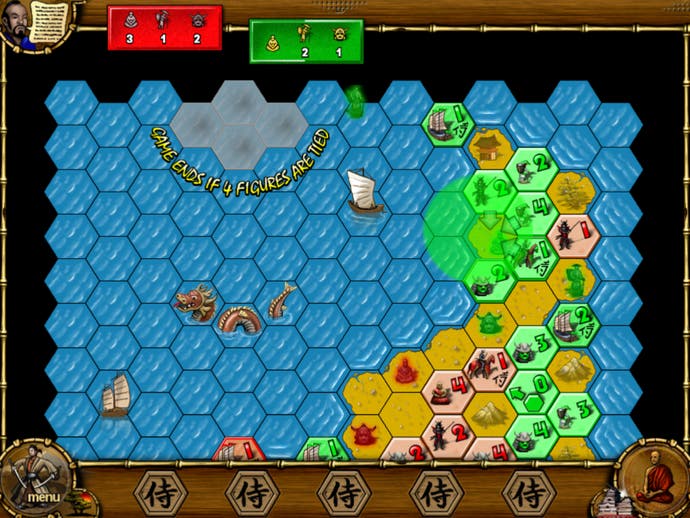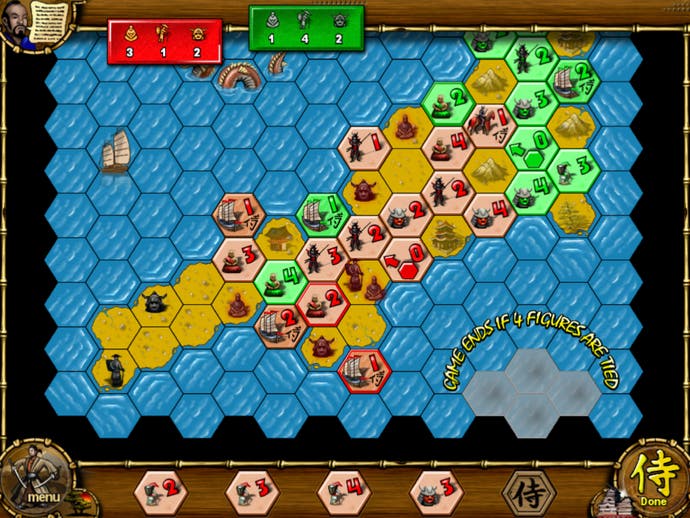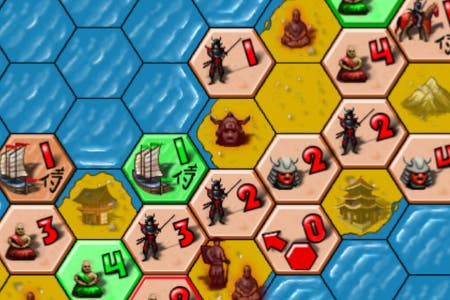App of the Day: Reiner Knizia's Samurai
You hexy thing.
Simple rules are the prerequisite for a good board game, and there are two reasons why. The first is that people can get down to playing the thing relatively quickly. But the second is that a combination of simple rules can lead to extremely complex systems: depth is not necessarily a matter of detail.
Samurai was designed by Reiner Knizia, the board-game megabrain from Germany, and is set on a hex-based map of feudal Japan. Yes I know the spod-klaxon goes off when there are hexes around, but ignore it. Scattered across this map are three types of figures: Buddhas, soldiers and peasants. Up to four players take it in turns to put down tokens around these figures, jostling for influence. When the figure is entirely surrounded, for example if every empty hex around it is occupied, the player with the most influence captures it.

Samurai's tokens are blunt and few, each with a number from 1-4 that reflects their influence. There are tokens for Buddhas, soldiers and peasants, which affect only the corresponding figure. There are ships and cavalry, which have little influence but can be used quickly. Then there are the Samurai themselves, which influence every type of figure.
The latter are the most precious, capable of turning hopeless situations and bringing heavyweight influence to bear across multiple figures. You hold five tokens during any turn, and whichever you use are randomly replaced, but can only put down one at a time: the exceptions being cavalry and ships, which can be put down for free.
Samurai can be played with random starting tokens or chosen ones, but in both the game shares the same rhythm. Early moves see both players establishing forward positions, getting rid of weak tokens if possible, poking and prodding and waiting for each other to make a real commitment.
The board's size can be deceptive, and once you have a handle on how many turns it takes to close sections off, new strategies open up. Playing passively can often lead to an easy victory against over-aggressive opponents. Samurai is easy to understand, but the strategies that come from its basic numerical 'combat' are legion. There are two special tokens, one of which returns a previously-used token to your hand, while the other switches the places of two figures on the map, and both are equally rare and surprising.

But their short-term shocks always lose out to long-term planning, a linked buildup that the opponent never sees coming until it's too late. Samurai's online options are designed around asynchronous multiplayer, further emphasising just how much thought should be going into these simple moves (although it can also be played 'live').
Sun Tzu's Art of War talks of the value in knowing your opponent. If you anticipate what they are minded to do in a given situation, your chances of victory are ever-greater. In Reiner Knizia's Samurai, this principle finds elegant expression.
App of the Day highlights interesting games we're playing on the Android, iPad, iPhone and Windows Phone 7 mobile platforms, including post-release updates. If you want to see a particular app featured, drop us a line or suggest it in the comments. For daily app coverage, check out our sister site Modojo.

